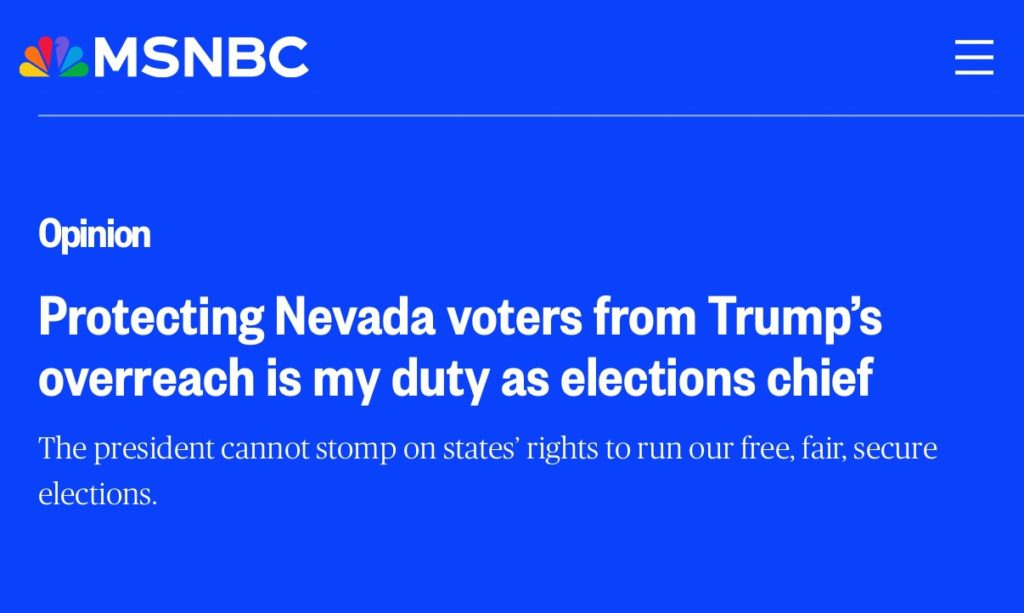Suits & Cases
Plus: A new column from Nevada’s chief election official. 🗳️
This Week in Democracy
- Pennsylvania Gov. Josh Shapiro’s home was attacked by an arsonist last Sunday. Thankfully, no one was injured. “This is not how we resolve our differences, and this is not okay,” Shapiro said. “This level of violence has to end, and it has to be roundly condemned by everyone, both political parties, people from all different walks of life.”
- The federal judge that blocked the Trump administration from deporting people under the Alien Enemies Act issued a new ruling. In it, he said the court had “probable cause” to hold members of the administration in criminal contempt of court for not returning people to the U.S. The judge said he would appoint an outside prosecutor if the matter was referred to the Justice Department and it declined to take up the case.
Federal judges in Colorado and Nevada issued rulings blocking the administration from continuing other deportations under the Act. Judges in New York and Texas issued similar rulings last week.
In a separate case, the U.S. Supreme Court affirmed part of a lower court’s ruling that the administration “facilitate” the return of a Maryland man to the U.S. who was deported because of an “administrative error.” So far, the man has not been returned. After the lower court issued a new order, the Justice Department asked an appeals court to block the ruling but was denied. The administration’s assertions “should be shocking not only to judges, but to the intuitive sense of liberty that Americans far removed from courthouses still hold dear,” the appeals court wrote in its decision.
- The U.S. Supreme Court will hear oral arguments about Trump’s executive order that would deny citizenship to some children born on American soil on May 15. The justices will consider whether federal judges have the authority to issue orders with nationwide effects.
- The White House announced it would restrict access for reporters from the Associated Press, Reuters, and Bloomberg. It’s the administration’s latest move that flies in the face of the First Amendment. It comes after a judge last week ordered the White House to restore access for AP reporters to cover White House events. The AP told the judge this week that the White House’s new policy defies his previous order.
The White House will also soon ask Congress to cut funding from the Corporation for Public Broadcasting, which funds organizations like PBS and NPR, according to reports.
- Secretary of State Marco Rubio announced that the State Department closed its office that monitors and counters disinformation from foreign countries.
“Stopping foreign disinformation campaigns from interfering in the internal affairs of the United States should be an issue that receives bipartisan support,” Issue One’s Liana Keesing said in a statement. “Unfortunately, the decision to dismantle [the State Department office] marks yet another alarming move by the second Trump administration to erode critical protections against foreign interference in our democracy.”
State of the States
In California, Gov. Gavin Newsom and Attorney General Rob Bonta sued the Trump administration over President Trump’s tariff policies. The state officials allege that the law Trump used to implement his tariffs—the International Emergency Economic Powers Act (IEEPA)—was improper because he falsely declared a national emergency. “The truth is the IEEPA does not apply here,” Bonta said at a press conference. “Trump has had to resort to creating bogus national emergencies that defy reason.”
“No state is poised to lose more than the state of California. … That’s why we’re asserting ourselves on behalf of 40 million Americans,” Newsom said.
In Maine, the Justice Department sued the state’s Department of Education over its policy towards transgender athletes.
“Today is the latest, expected salvo in an unprecedented campaign to pressure the State of Maine to ignore the Constitution and abandon the rule of law,” Gov. Janet Mills said in a statement. “This matter has never been about school sports or the protection of women and girls, as has been claimed, it is about states [sic] rights and defending the rule of law against a federal government bent on imposing its will, instead of upholding the law.”
In North Carolina, the State Board of Elections said in a court filing that it would review 1,675 ballots in Judge Jefferson Griffin’s challenge to the results of the 2024 state Supreme Court election. The Board said it would check those voters’ eligibility and, if necessary, contact each of them within 30 days to offer them the opportunity to provide the documents necessary to prove they are eligible to vote. Griffin disputes the State Board’s filing and claims that over 5,000 ballots should be reviewed.
Griffin challenged the eligibility of more than 65,000 voters in an effort to overturn his 734-vote loss. Last week, the state Supreme Court ruled that the vast majority of those voters’ ballots should be counted.
Recommended Reading
Nevada Secretary of State Cisco Aguilar writes about how President Trump’s election-related executive order would interfere with the work of state and local election officials in a new op-ed for MSNBC.
